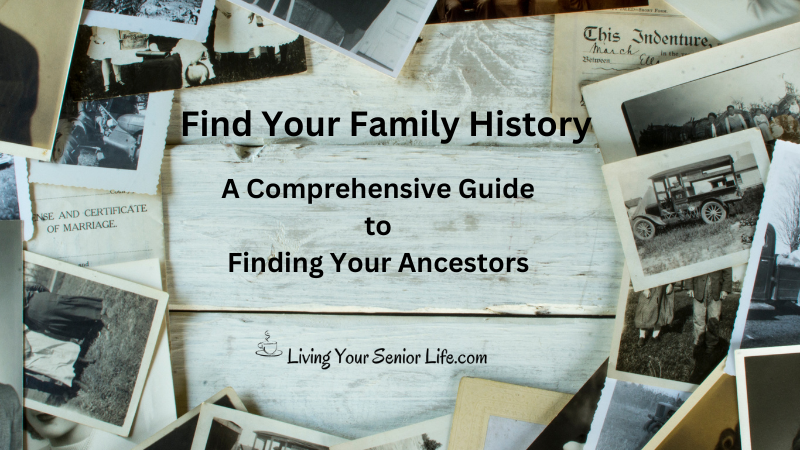If you’ve ever wondered about your family history, you’re not alone. Many people are curious about their ancestors’ lives, occupations, countries of origin, and more. Find Your Family History: Ips and Resources provides an overview of the steps and tools involved in family history research to help you start on your journey to discovering your family’s past.
This guide will cover everything from finding documents and records to talking to family members and utilizing local libraries and archives. With the help of online databases, genealogy societies and clubs, and expert advice, you can piece together your family history and preserve your findings for future generations. So, let’s get started on uncovering your family’s fascinating past.
Key Takeaways:
- Discovering your family history can be a rewarding and fulfilling experience.
- There are many tools and resources available to help you in your research, including online databases, genealogy societies and clubs, and expert advice.
- By preserving your findings and sharing your family history with others, you can ensure that your ancestors’ legacy lives on.
What Is Genealogy And Why Is It Important
Genealogy is the science of tracing and studying family lineage, ancestry, and history. It enables you to learn about your ancestors and their cultural background, which can help you understand your identity and sense of belonging. Genealogy also helps preserve family stories and traditions for future generations. By researching your family tree, you can uncover medical conditions that may impact your life. Knowing your family history is crucial in understanding your roots and connecting to your past.
Overview Of The Steps And Tools Involved In The Research of Your Family History
Researching your family history involves several steps and tools that can help you uncover your family’s past. By following these steps and using these tools, you can create a detailed family tree and gain a better understanding of your family’s history.
The steps involved in family history research include:
- Gathering Documents and Records
- Talking to Family Members
- Local Libraries and Archives
- Historic Sites and Cemeteries
- Utilizing Online Resources
- Genealogy Societies and Clubs
- Genealogy Online Sites
- Consulting Experts
- Preserve and Document
- Sharing
Video: Find Your Family History
Finding Documents and Records
When researching your family history, finding records is an essential part of the process. Records can provide valuable information about your ancestors and help you build your family tree. You can search for these records online or in physical archives. You can also find documents and records through family members, local libraries, or historical societies.
The internet is full of valuable information and resources that can help you discover your family history and the story of your ancestors. However, it is important to remember that not all records are available online. Some records may be available in physical archives, and private individuals may hold some records.
Examples of documents and records you can collect include birth certificates, marriage certificates, death certificates, baptismal records, wills, census records, newspapers, military records, and more.
Vital Records
Vital records are legal documents that include birth and death certificates, marriage licenses, and other legal documents that can provide important details about your ancestors. These records can be found in archives or online databases.
Searching through vital records can provide detailed information such as family names, dates of birth and death, and place of residence. However, it’s important to remember that sometimes errors can occur in the copies or transcription of the original document. So, whether searching through vital records yourself or relying on external sources, it’s essential to be careful when interpreting their data.
But by exploring and analyzing these records carefully, you can begin to unravel the mystery of your family history.
Church Records
Church records are a fantastic resource for family historians. They contain vital information about your ancestors, such as their births, marriages, and deaths. Many churches have historical archives that may contain other relevant documents. Church records can include records of congregation meetings, financial records, and other church activities. These records can provide vital details about a person’s life and history. You may also find cemetery records in some churches, which can provide insight into the lives of your ancestors.
Census

A census is an invaluable tool for family history research. It provides detailed information about individuals and their families that can be used to trace family connections and uncover migration patterns and ancestry. In addition to the US census, many countries have their own national censuses, which can be accessed through local archives or libraries.
Newspapers
Newspapers are an often-overlooked source of family history information. They can contain obituaries, marriage announcements, and other records that will help you trace your family’s past. Besides local newspapers, some libraries also have extensive collections of international newspapers, which can be helpful in tracing distant relatives. I
f you’re searching for genealogical information in newspapers from all over the world, online archives such as GenealogyBank may be helpful. These databases allow you to search for keywords and phrases across thousands of historical publications. Additionally, online newspaper databases such as Newspapers.com allow you to search for keywords and phrases across thousands of historical publications.
Military Records

Military records may not come to mind when you’re deciding where to research, but actually, they can give you a lot of information. Military records can include discharge papers, service memorabilia, and medals. They can also provide detailed information such as birth and death dates, service dates, ranks, etc. Military records can be found in archives or online databases.
Talking to Family Members

One of the most effective ways to research your family history to find your relatives is by interviewing family members. To ensure a successful interview, it is important to create a comfortable environment and respect the interviewee’s wishes. Remember that some family members may not remember everything or may be uncomfortable discussing certain topics. Be patient, kind, and thank them for their time and stories.
Prepare a list of questions and have a notebook ready to record the answers. Some questions you might ask include:
- What do you know about your family’s immigration to the United States?
- What was your family’s occupation when you were young?
- Can you share any stories or anecdotes about your family?
- Do you have any pictures or other memorabilia from the era?
To help jog memories and get the conversation started, bring along photos, heirlooms, or other mementos. Remember that interviews can be conducted in person, over the internet, or by phone.
Utilize Local Libraries and Archives

Libraries and Archives
When researching your family history, local libraries and archives can be an invaluable resource. Libraries often have a wealth of genealogical materials, including books, databases, and microfilm. Archives, on the other hand, are specialized repositories for documents and records, often containing original documents such as birth, marriage, and death certificates, as well as family histories and genealogies written by family members.
To make the most of your research, it is important to be aware of each library or archive’s policies and procedures. Taking the time to review each document carefully and asking for help with search filters and advanced search options can save you time and prevent frustration. Utilizing the resources available at local libraries and archives can provide valuable insights into your family’s history.
Historic Sites and Cemeteries

Visiting cemeteries and historic sites can provide valuable insights into your family’s past. By exploring the historical context of these places, you can uncover clues about your ancestors. Consider the following tips:
- Look for cemetery records that may provide information such as birth and death dates, place of origin, and names of relatives.
- Search for historical markers or monuments that may shed light on important events or people in your family’s history.
- Check local historical societies or archives for additional information or resources.
Remember to be respectful of these sites and follow any posted rules or regulations.
Online Databases
Online databases are a valuable resource for researching your family history. They are easy to use, accessible from anywhere, and often free. By searching for your ancestor’s name and including as much information as possible, you can quickly locate records. You can also narrow your search by including keywords such as location or occupation.
One of the benefits of using online databases is that they provide access to records that may not be available in physical archives. Additionally, researching online can save time and energy, allowing you to find records quickly and organize your research. Many online databases offer helpful search tips and hints that can assist you in finding records, even if you don’t have much information.
When you find a record, take the time to review it carefully to ensure accuracy and collect all the information you can. Remember to document your discoveries and share your family history with others.
Finally, online databases allow collaboration with other researchers, making it easier to compare data and build a more complete family tree. Some online databases may offer a free trial period, which can be helpful in determining if the database is right for your research needs.
Benefits of Using Online Databases:
- Easy to use, accessible from anywhere, and often free
- Provide access to records that may not be available in physical archives
- Save time and energy, allowing you to find records quickly and organize your research
- Offer helpful search tips and hints
- Allow collaboration with other researchers
- Some may offer a free trial period
Genealogy Societies and Clubs
Joining a genealogy society or club can provide you with access to exclusive sources and databases, as well as opportunities to learn from other genealogists with similar interests. You can also participate in events and workshops to learn more about genealogy research techniques. Consider joining a local society or club to expand your knowledge and connect with others in the genealogy community.
Genealogy Online Sites
If you are interested in tracing your family history, there are several online genealogy sites available. These sites provide access to billions of historical records and allow you to search for specific information about a person, place, or family. Some of these sites offer free services, while others require a subscription to access some of the features.
Ancestry.com
Ancestry.com is a popular genealogy research website that provides access to billions of records from around the world. With free family tree building and census records, you can start piecing together your family history. Ancestry.com also offers subscription services that provide additional features and resources to help you uncover your family’s past.
Ancestry.com has a powerful search tool that allows you to search for family members and genealogical information. It also has a DNA testing service that can help you discover your ethnic origins and connect with living relatives.
FamilySearch.com
FamilySearch.com is a free online genealogy database that allows you to search for family histories and genealogical records. It features millions of records from around the world and allows you to search for birth, marriage, and death certificates, census records, military records, and more.
FamilySearch.com has various features that can help you discover more about your ancestors, such as a timeline view, maps, and life stories. It also has a large community of volunteers who help to index and transcribe records, making it easier to find the information you need.
FindMyPast.com
FindMyPast.com is a website that offers free access to millions of historical records. It contains vital information about family histories, such as birth, marriage, and death records, as well as immigration and military records.
FindMyPast.com offers detailed timelines that can help you see the progression of your family members throughout history. Although there are free services available, a subscription is needed for some services.
MyHeritage.com
MyHeritage.com is a genealogy website that allows you to search for death certificates, historical records, military records, and other documents. Its main user base started in Europe, making it a great resource for those with European ancestry.
MyHeritage.com offers a free basic plan and three upgraded paid plans. It also has a DNA testing service that can help you discover your ethnic origins and connect with living relatives.
Talk to Experts
When it comes to family history research, talking to experts can be a valuable resource. Professional genealogists can offer expert analysis of your family tree, help you break down brick walls, and create research plans. Local historical societies and libraries may also have experts to help with your research.
When seeking expert help, it is important to be clear about your research goals, time frame, and budget. Additionally, consider the expert’s qualifications, experience, and expertise. It is important to get expectations in writing and to stay in contact with the expert throughout the process.
Talking to experts can provide valuable insights and advice, helping you to navigate complicated records and uncover new information. With the right expert and a clear understanding of your goals, you can make significant progress in your family history research.
Get a DNA Test

If you’re interested in tracing your ancestry and learning more about your family tree, a DNA test can be a valuable tool. There are several types of DNA tests available, each with its own level of accuracy and cost. Here are the main options:
Types of DNA Tests
Home Kits
Home kits are a popular and affordable option for genealogists. These kits can be purchased online or from genealogy retailers and typically include a saliva sample, a spit kit, and instructions. They are easy to use and provide satisfactory accuracy for genealogists who don’t need absolute certainty. Many genealogy websites also provide free online tutorials and help using home kits.
Saliva Swab Tests
Saliva swab tests are more accurate than home tests but are more expensive and time-consuming to administer. You must visit a lab to collect a saliva sample in the prescribed manner and pay for the test directly. If you opt for this type of test, be sure to read the instructions carefully before collecting the sample and ask any questions you may have regarding the process.
Cheek Swab Tests
Cheek swab tests provide an accurate readout of genealogical ancestry with just a small amount of DNA required per test result. These tests are easy to use and don’t require special steps or equipment other than a swabbing device that fits inside your mouth. They’re also less expensive than saliva tests but still cost about $100-$200 per kit, depending on the brand and type of test used.
Hair Test Strips
Hair test strips are popular with genealogists because they’re easy to use and accurate. However, these tests can cost upwards of $300 per kit, depending on the brand and type of test.
Blood Tests
Blood tests are the most expensive and time-consuming DNA test option, but they’re also the most accurate. You’ll need to visit a lab to have your blood drawn and then pay for the test, which can cost over $1,000 depending on the brand and type of test used.
In conclusion, there are several types of DNA tests available to genealogists, each with its own level of accuracy and cost. Home kits are a popular and affordable option, while saliva swab tests are more accurate but more expensive. Cheek swab tests are easy to use and less expensive than saliva tests, while hair test strips are accurate but costly. Blood tests are the most accurate but also the most expensive and time-consuming. Consider your budget and your research needs when deciding which type of DNA test to choose.
Preserve Your Findings

Documenting and preserving your family history research is essential in order to keep track of your findings and stay organized. It can also help you recognize patterns, fill in missing pieces of the puzzle, and make sharing your findings more accessible.
When documenting your discoveries, include as much information as possible, such as dates, places, names, and any other relevant details. Consider using tables, bullet points, and bold text to clearly convey your findings.
It is also crucial to save and back up your documents to protect them from natural disasters and other potential risks. Consider using cloud storage or an external hard drive to keep your findings safe.
Finally, consider adding [photos] to your documentation to provide visual context and make your family history research more engaging.
Share Your Family History with Others

Taking the time to document your discoveries and share your stories with future generations can be a great way to ensure that your family’s legacy is preserved.
You can share your family history with others in many ways, such as by creating a photo album, writing a book about your family, creating a family website, creating a family tree or hosting a family reunion.

Utilize Online Resources to Share Stories
Sharing your family history with others can be a rewarding experience. One way to do this is by using online resources to share your stories and research. Creating a blog or website is a great way to share and document your research. You can also create a page on social media to share photos, documents, videos, and stories.
Genealogy websites such as Ancestry and MyHeritage can be used to create and share a family tree or to search for information about your ancestors. These websites provide a platform to connect with other family members and share information about your family history.
In addition to genealogy websites, there are also numerous other online resources available to help you share your family history. These include online family history forums, online family history communities, and online family history groups.
By utilizing these online resources, you can easily share your family history with others and preserve your family’s legacy for future generations.
FAQs
Should I search for all of my ancestors or just those who are still alive?
When starting your genealogy research, it’s best to gather as much information as possible from living relatives. Once you’ve exhausted this source, you’ll want to explore records and other sources to find out more about your ancestors. It’s important to note that tracing your family history is a long-term process, and you may not be able to find information on every ancestor.
What is meant by family history?
Family history is the research of a person’s ancestry, tracing back generations. It involves finding out more about family connections, cultural traditions, and histories of family members. By exploring your family history, you can gain insight into your identity and culture.
Is hiring a professional genealogist worth it?
Professional genealogists can be worth it if you have been researching your family tree and need guidance. They can help you find records that are difficult to access and interpret them to make sense of the data. Moreover, they can provide expert advice on how to proceed with your research and can assist you in furthering your genealogy journey.
Additional Reading
Conclusion
Genealogy research and finding your ancestors can be a fulfilling hobby that provides a deeper understanding of your family and yourself. Whether you find it rewarding or frustrating, there are many tips and stories to share with others. Don’t be afraid to ask for help or advice, and remember that every family has a unique story waiting to be discovered. Keep exploring and discovering your family history!
Do you have any stories or tips you want to share about your genealogy research? Please comment below.










